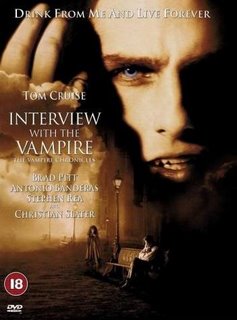 Director: Neil Jordan
Director: Neil Jordan
Release Date: 1994
Contains spoilers
The problem with Interview With the Vampire, The Vampire Chronicles, is knowing where to start. The series of books by Anne Rice are a phenomena in their own right and this is probably one of the most popular vampire films produced. It does deviate from the book, not only by missing some areas (of story and character development) out – which given the length of the book was always going to be a given – but by changing some minor aspects. All in all, however, it is a fairly accurate translation of the book.
It begins with Louis de Pointe du Lac (Brad Pitt) in a hotel room with an interviewer (Christian Slater). Louis was going to feed on the interviewer, in an alleyway before the film begins, until he spoke. The interviewer is a collector of lives, finding interesting people and asking them to recount their life stories for him. When he asks Louis what he does, it is clear he could never have expected the answer “I am a vampire.” Louis puts on the light and then moves, with a speed unmatchable by a mere mortal, back to the table. In the light it is clear that Louis is something unnatural. His skin is a deathly pallor, vivid blue veins visible beneath the skin. His nails are long and glossy and his eyes shine with a luminescence born of the supernatural. The look the vampires are given is well done, unusual enough that we can see they are something else, yet we could also believe that they could pass for normal in society.
The interviewer is obviously convinced and Louis begins his tale in 1791. He was 24 and master of a plantation. His wife and child had died six months before, a departure from the book as it was his brother who had died in that, and Louis was so filled with grief that he became out of control. He whored, gambled and generally put his life on the line. In his own words the invitation to death “Was open to anyone. To the whore at my side. To the pimp that followed. But it was a vampire that accepted.”
Louis is robbed by the pimp 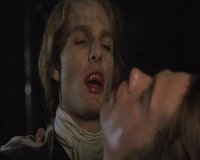 and suddenly the whore and pimp are killed. He is picked up by the vampire, Lestat de Lioncourt (Tom Cruise), and bitten. This is where we depart from the book again (and the rules it established), and a section that, whilst it looked flash I am not too sure about. Lestat flies into the air with Louis as he bites. In the books the power of flight was only attained by the most ancient vampires (and those who drank from the ancients). One might say that Lestat is lifting Louis above the dross of humanity and yet it seems a scene there for effect only.
and suddenly the whore and pimp are killed. He is picked up by the vampire, Lestat de Lioncourt (Tom Cruise), and bitten. This is where we depart from the book again (and the rules it established), and a section that, whilst it looked flash I am not too sure about. Lestat flies into the air with Louis as he bites. In the books the power of flight was only attained by the most ancient vampires (and those who drank from the ancients). One might say that Lestat is lifting Louis above the dross of humanity and yet it seems a scene there for effect only.
The next night Lestat visits an ill looking Louis and offers him “the choice I never had”. Louis watches his last sunrise and Lestat comes again. He drains Louis to the point of death and then gives him the choice. Drink of his blood or die. Louis chooses to drink, he goes through a painful mortal death and then opens his eyes as a vampire. We see the world through his eyes, a statue that seems to open its eyes shows us this but, as he informs the interviewer, no mortal could ever know what it was like. We also learn some of the vampiric rules. Crucifixes are not effective, nor is a stake through the heart. Coffins and blood are a necessity. Later we discover that vampires can drink animal blood, though, as Lestat informs us, “I wouldn’t call it living, I’d call it survival.” Fire and sunlight are effective. Beheading also.
There is also the interesting idea that a vampire will only drain to the point of death, lest the dying mortal kill the vampire by drawing them into the death. This suggests that the act of feeding is very much an intimate one that makes a connection between the vampire and victim. We also discover that the blood of the dead must not be drunk by a vampire. Finally the various vampires receive gifts, Lestat can read minds though it is not an ability that Louis enjoys. I really don’t want to go through the plot point by point as I would be here for quite a while but there are some major plot points that we need to investigate.
The next section of the film follows Louis and Lestat’s time together, whilst Louis remains at odds with his vampiric nature. 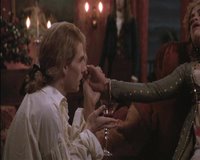 We see now two very different vampires. Louis does not wish to kill and Lestat is a brutal killer gorging on two or three victims per night. Lestat is also a sadist, enjoying playing wicked games with his victims. When asked why he does this he states “I like to do it. I enjoy it.”
We see now two very different vampires. Louis does not wish to kill and Lestat is a brutal killer gorging on two or three victims per night. Lestat is also a sadist, enjoying playing wicked games with his victims. When asked why he does this he states “I like to do it. I enjoy it.”
Louis is filled with guilt and thus does not wish to kill to survive. Lestat comments upon this when he says, “Merciful death. How you love your precious guilt.” Instead Louis feeds upon the blood of animals and, when he slips, he becomes enraged at himself. We see this when he attacks his slave and housekeeper, Yvette (Thandie Newton), following which he burns his grand home to the ground and is rescued from the conflagration by Lestat.
The temptation, of course, is always going to be there as only drinking from a human will give him any form of peace. Eventually he slips once more and attacks a young child, Claudia (Kirsten Dunst), who is by her plague killed mother’s side.
This brings us to the next section of the movie. Lestat finds Louis and brings him home.  Claudia is not yet dead and Lestat threatens to turn her. Louis wants to stop him but his own guilt gets in the way, it is the only way that she will survive. Lestat’s motivation seems simple, when he explains to Claudia “You see, Louis was going to leave us, he was going to go away, but now he's not. Now, he's going to stay and make you happy.” This is the master manipulator but these characters are not one dimensional and Louis suspects there were more complex, individual reasons for his actions.
Claudia is not yet dead and Lestat threatens to turn her. Louis wants to stop him but his own guilt gets in the way, it is the only way that she will survive. Lestat’s motivation seems simple, when he explains to Claudia “You see, Louis was going to leave us, he was going to go away, but now he's not. Now, he's going to stay and make you happy.” This is the master manipulator but these characters are not one dimensional and Louis suspects there were more complex, individual reasons for his actions.
Claudia’s turning is strange in that when she turns her hair suddenly develops ringlets; to be honest I could not see why that would occur, though they do prove a plot-point later. From the first she is a ruthless killer and her presence seems to make Louis more at ease with his own nature as a predator.
The three live together as a family for thirty years, but it is a relationship doomed. Claudia becomes obsessed with the fact that she is forever trapped within a child’s body, to the point of killing a mature woman she wants to be and hiding her rotting corpse in the house (raising the question of why neither Louis or Lestat smelt the corpse, after all Louis later states that he can smell death). This turn of events is probably not helped by Lestat who still treats her as a child. It is unlikely that the maturity she seeks is a sexual maturity; whilst not explicit in the film the books explain that the vampires have no sexual drive. Rather it is about change for its own sake, about evolution which is the major thrust of the movie and shall be discussed later.
Claudia tries to cut away her doll-like locks and they immediately grow back. She is unchanging and she blames Lestat. To avenge herself, and free herself and Louis from Lestat,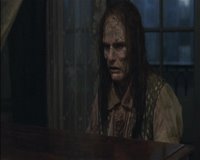 she feeds Lestat from boys she has killed with Laudanum, keeping the blood warm and giving the appearance that they have passed out. She then slits Lestat’s throat and she and Louis dump him in the swamps. Louis and Claudia book passage to Europe but Lestat returns, looking worse for wear and rather angry. In their bid to escape Louis throws an oil lamp at Lestat, setting him alight and causing a blaze that rips through the city.
she feeds Lestat from boys she has killed with Laudanum, keeping the blood warm and giving the appearance that they have passed out. She then slits Lestat’s throat and she and Louis dump him in the swamps. Louis and Claudia book passage to Europe but Lestat returns, looking worse for wear and rather angry. In their bid to escape Louis throws an oil lamp at Lestat, setting him alight and causing a blaze that rips through the city.
The next stage of the film sees the two vampires in Paris. They have searched Europe for more of their own kind and failed but in Paris vampires find them. The vampires in Paris live in catacombs below a theatre – the Théatre des Vampires. In the theatre the vampires pretend to be humans pretending to be vampires (“How avant-garde.” Remarks Claudia). The show seems to culminate with the vampires killing and feasting on a victim with the audience tricked into believing it to be part of the show.
 The leader of these vampires is Armand (Antonio Banderas). Whilst his performance is excellent I must admit to being slightly unhappy with the casting as Armand is emblazoned in my mind, from the books, as a golden haired youth – that is somewhat petty however. Armand allows us to know the real crux of the vampire problem. He is the oldest, that he is aware of, vampire. Most vampires do not have the stomach for immortality, the world changes around them and they remain the same. It is the key to the whole piece, a failure to evolve is the undoing of immortality. Armand wants Louis to be his guide to the new era.
The leader of these vampires is Armand (Antonio Banderas). Whilst his performance is excellent I must admit to being slightly unhappy with the casting as Armand is emblazoned in my mind, from the books, as a golden haired youth – that is somewhat petty however. Armand allows us to know the real crux of the vampire problem. He is the oldest, that he is aware of, vampire. Most vampires do not have the stomach for immortality, the world changes around them and they remain the same. It is the key to the whole piece, a failure to evolve is the undoing of immortality. Armand wants Louis to be his guide to the new era.
We discover that there is a belief that children should not be turned and that the one vampire crime is to kill another vampire. This puts Claudia in danger but, in truth, it probably has more to do with Armand wishing to sever Louis’ ties to her, to make Louis be with him. Claudia senses this and finds Madeleine (Domiziana Giordano), a woman who has lost her child, to be her new companion. However she needs Louis to turn her as she doesn’t have the strength in her small frame. Louis does this but feels that, as Madeleine dies,  “What has died is the last breath in me that was human.”
“What has died is the last breath in me that was human.”
Madeleine’s tenure as a vampire is short lived. The vampires from the theatre, led by Santiago (Stephen Rea), take the three. They bury Louis alive and then put Claudia and Madeleine into a well to be killed by the sun. Louis is rescued by Armand, though he waits until Claudia has perished. Louis gets his revenge by destroying the whole coven, setting them alight in their coffins and finishing the others off by scythe. 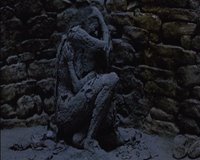 Out of the burning theatre he is caught by the rising sun but is rescued by Armand, however he can see Armand’s hand in the events and refuses his companionship.
Out of the burning theatre he is caught by the rising sun but is rescued by Armand, however he can see Armand’s hand in the events and refuses his companionship.
The final section of the film is a series of codas that witness Louis through the ages, represented often by cinema. In 1988 he finds Lestat again, a broken wretch scared by the searchlights from helicopters but refuses to stay with him. The interviewer is despondent, the story cannot end like that and offers himself as a companion for Louis but the interviewer has not understood. He shows the interviewer his true, enraged face and then leaves. Running to his car, the interviewer reviews the tapes when Lestat rises from the back seat and attacks, offering the interviewer a choice he never had.
Minor plot and casting quibbles aside, and they are very minor; this is a glorious and sumptuous film. Direction and cinematography are beautiful as is Elliot Goldenthal’s score. Brad Pitt makes Louis seem sympathetic, despite his maudlin nature. That said the film is peppered with stars and all performances are strong but two stand out.
Anne Rice was not happy with the casting of Cruise as Lestat and publicly said so, at the time I agreed. Yet when she had seen the film she openly apologised and the reason is obvious, this is a fine performance by Cruise who takes Lestat and makes the character his own.
However top praise must go to Kirsten Dunst, still a child actor at the time, whose performance as Claudia is faultless, carrying a maturity in her acting that belies her youth. It would have been too easy to cast a child actor who would have spoilt the film, Dunst's presence is as strong as the adults involved.
This is a stunning film and a must for all fans of the genre. It carries a slight weight of the melodramatic perhaps, but this is balanced by the low-key humour that peppers the film, from Lestat dancing with the corpse of Claudia’s mother (“There's still life in the old lady yet.”) to some of the vaudeville performances in the theatre.
 I am going to give Interview with the Vampire 10 out of 10, I considered a point lower but felt that I was letting my own expectations from the book cloud, ever so slightly, a masterpiece of vampire cinema. I guess, however, that I must confess to being a fan of Neil Jordan's work anyway.
I am going to give Interview with the Vampire 10 out of 10, I considered a point lower but felt that I was letting my own expectations from the book cloud, ever so slightly, a masterpiece of vampire cinema. I guess, however, that I must confess to being a fan of Neil Jordan's work anyway.
The imdb page is here.
I am going to give the last word to Lestat, “Oh Louis, Louis. Still whining Louis.”
Sunday, August 27, 2006
Interview With the Vampire - review
Subscribe to:
Post Comments (Atom)
















7 comments:
I never could get passed the Tom Cruise element. Though I full-heartedly agree that Brad Pitt and Kirsten Dunst do a fabulous job.
I remember leaving the theater and telling my friends, "That little girl [Dunst] is going to be a big star."
A great movie, and one of the few my wife will watch with me.
Cheers Mark.
I can understand the Cruise reticence, it just shouldn't be right - then as much as I like Rutger Hauer, he may well not have worked and he was Anne Rice's first choice. Lestat is a very iconic character and anyone who has read the chronicles has their own thoughts of exactly how he should be.
10/10. Well, I can't say I agree but I guess is more of my taste for vampires. This movie and books started the whole "sexy-gothic vampires" thing which I not always like. But yes, as a movie is quite well done. I think, though, that the casting hurts the movie. Cruise's exxagerated grandeur, overacting is a little bit too much.
The T, I actually think Cruise works - I scored this at 10 because, as a gothic melodrama it is nigh on perfect - the over acting actually feeds into this imho. That said, it is Dunst who steals the show.
It is all a matter of taste though and, as I confessed in the review, I'm a fan of Jordan's directing anyway.
I know it isn't the main topic you review, but I'd really be interested in reading your take on The Vampire Chronicles. After reading this review it seems clear you have read them, but I did not see them listed in your novel reviews. Perhaps this is something you would consider writing?
Hi Margaret. The main reason I don't have that many book reviews is that I feel it necessary to review a book just after reading it in order that I can do it justice. This means there are a lot of books I've read that I haven't reviewed because I read them some time ago.
The thing about movies is it is much easier and quicker to re-watch a 90 minute movie than re-read a novel for review.
That said there are some books I need to look at again. The vampire chronicles are one such series, salem's lot another book and fevre dream yet another, all of which deserve a place here. The problem is finding time (I have just been contacted about reviewing a book and described my 'to read' pile as up to my nose and its probably not an exageration).
It is possible that, rather than reviewing them, I'll do a classic literature feature iro them - and most probably sensible when it comes to the chronicles. Timescales are another matter!
Thanks for the explanation. That makes a lot of sense and I can't fault you for not wanting to write a review for something that it has been years since you've read. It is certainly more of a challenge to write a review of a series or a book than it is to write one for a film, I agree. If you do get around to writing something on them though, I'll be interested in reading it!
Post a Comment